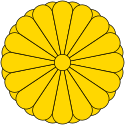1936 Japanese general election
Appearance
| ||||||||||||||||||||||||||||||||||||||||||||||||||||||||||||||||||||||||||||||||||
All 466 seats in the House of Representatives of Japan 234 seats needed for a majority | ||||||||||||||||||||||||||||||||||||||||||||||||||||||||||||||||||||||||||||||||||
|---|---|---|---|---|---|---|---|---|---|---|---|---|---|---|---|---|---|---|---|---|---|---|---|---|---|---|---|---|---|---|---|---|---|---|---|---|---|---|---|---|---|---|---|---|---|---|---|---|---|---|---|---|---|---|---|---|---|---|---|---|---|---|---|---|---|---|---|---|---|---|---|---|---|---|---|---|---|---|---|---|---|---|
| ||||||||||||||||||||||||||||||||||||||||||||||||||||||||||||||||||||||||||||||||||
 | ||||||||||||||||||||||||||||||||||||||||||||||||||||||||||||||||||||||||||||||||||
| ||||||||||||||||||||||||||||||||||||||||||||||||||||||||||||||||||||||||||||||||||
| This article is part of a series on |
 |
|---|
|
|
General elections were held in Japan on 20 February 1936.[1] Rikken Minseitō emerged as the largest party in the House of Representatives, winning 205 of the 466 seats. Following the elections, an attempted coup took place on 26 February.
Electoral system
[edit]The 466 members of the House of Representatives were elected from multi-member constituencies with between three and five seats.[2]
Results
[edit] | |||||
|---|---|---|---|---|---|
| Party | Votes | % | Seats | +/– | |
| Rikken Minseitō | 4,444,413 | 39.92 | 205 | +59 | |
| Rikken Seiyūkai | 4,188,029 | 37.62 | 174 | –127 | |
| Shōwakai | 531,772 | 4.78 | 20 | New | |
| Shakai Taishūtō | 518,844 | 4.66 | 18 | +13 | |
| Kokumin Dōmei | 421,632 | 3.79 | 15 | New | |
| Others | 1,027,988 | 9.23 | 34 | +22 | |
| Total | 11,132,678 | 100.00 | 466 | 0 | |
| Valid votes | 11,132,678 | 98.96 | |||
| Invalid/blank votes | 116,886 | 1.04 | |||
| Total votes | 11,249,564 | 100.00 | |||
| Registered voters/turnout | 14,304,546 | 78.64 | |||
| Source: Voice Japan | |||||
By prefecture
[edit]| Prefecture | Total seats |
Seats won | ||||||
|---|---|---|---|---|---|---|---|---|
| Rikken Minseitō | Rikken Seiyūkai | Shōwakai | Shakai Taishūtō | Kokumin Dōmei | Others | Ind. | ||
| Aichi | 17 | 7 | 6 | 1 | 3 | |||
| Akita | 7 | 4 | 2 | 1 | ||||
| Aomori | 6 | 2 | 3 | 1 | ||||
| Chiba | 11 | 5 | 6 | |||||
| Ehime | 9 | 5 | 4 | |||||
| Fukui | 5 | 2 | 1 | 1 | 1 | |||
| Fukuoka | 18 | 4 | 8 | 1 | 1 | 4 | ||
| Fukushima | 11 | 6 | 5 | |||||
| Gifu | 9 | 5 | 4 | |||||
| Gunma | 9 | 5 | 3 | 1 | ||||
| Hiroshima | 13 | 7 | 3 | 3 | ||||
| Hokkaido | 20 | 10 | 7 | 1 | 2 | |||
| Hyōgo | 19 | 10 | 7 | 1 | 1 | |||
| Ibaraki | 11 | 4 | 3 | 3 | 1 | |||
| Ishikawa | 6 | 3 | 3 | |||||
| Iwate | 7 | 1 | 5 | 1 | ||||
| Kagawa | 6 | 3 | 3 | |||||
| Kagoshima | 12 | 7 | 1 | 4 | ||||
| Kanagawa | 11 | 6 | 3 | 2 | ||||
| Kōchi | 6 | 2 | 2 | 1 | 1 | |||
| Kumamoto | 10 | 1 | 5 | 4 | ||||
| Kyoto | 11 | 8 | 2 | 1 | ||||
| Mie | 9 | 5 | 3 | 1 | ||||
| Miyagi | 8 | 3 | 4 | 1 | ||||
| Miyazaki | 5 | 1 | 2 | 1 | 1 | |||
| Nagano | 13 | 7 | 3 | 1 | 2 | |||
| Nagasaki | 9 | 4 | 3 | 1 | 1 | |||
| Nara | 5 | 3 | 1 | 1 | ||||
| Niigata | 15 | 7 | 4 | 1 | 2 | 1 | ||
| Ōita | 7 | 3 | 4 | |||||
| Okayama | 10 | 3 | 6 | 1 | ||||
| Okinawa | 5 | 2 | 2 | 1 | ||||
| Osaka | 21 | 11 | 4 | 1 | 4 | 1 | ||
| Saga | 6 | 4 | 2 | |||||
| Saitama | 11 | 4 | 5 | 1 | 1 | |||
| Shiga | 5 | 2 | 2 | 1 | ||||
| Shimane | 6 | 5 | 1 | |||||
| Shizuoka | 13 | 5 | 6 | 1 | 1 | |||
| Tochigi | 9 | 6 | 3 | |||||
| Tokushima | 6 | 3 | 2 | 1 | ||||
| Tokyo | 31 | 16 | 8 | 5 | 1 | 1 | ||
| Tottori | 4 | 2 | 1 | 1 | ||||
| Toyama | 6 | 3 | 3 | |||||
| Wakayama | 6 | 2 | 3 | 1 | ||||
| Yamagata | 8 | 2 | 4 | 1 | 1 | |||
| Yamaguchi | 9 | 1 | 6 | 1 | 1 | |||
| Yamanashi | 5 | 1 | 1 | 2 | 1 | |||
| Total | 466 | 205 | 174 | 20 | 18 | 15 | 6 | 28 |
Notes
[edit]- ^ Combined performance of Social Democratic Party and Rōnō Taishūtō.




